Mental health issues were the primary cause of the recent deaths of famous celebrities such as Anthony Bourdain, Kate Spade, Avicii and Chester Bennington. I wish peace to their families and friends.
I hope that these deaths don’t go in vain but serve as a wake-up call for the rest of us. Across one’s lifetime, there’s a very high likelihood of going through a mental health issue. Studies suggest that about 25% of all people suffer a mental disorder in any 12 month window. This means that it’s likely that one in four people you know have recently gone through a depression or an anxiety episode.
This figure is shockingly high and doesn’t seem to match with our everyday experience. For the most part, our friends, family, and co-workers seem to be their normal selves and sometimes even happy. You surely think you would have noticed when people you know were mentally not well.
But, would you really have?
Depression and anxiety are these weird invisible monsters that usually only the sufferer can see. Talking about these things in public is an unfortunate taboo that I wish goes away. People going through an episode usually come up with valid-sounding excuses to avoid social situations and when they’re forced to attend, they’ll put up a smile so you wouldn’t notice. In fact, in my experience, people who are hilarious in social situations are often anxious or depressive in their private lives. Humor and depression may be related.
For those who don’t know what depression feels like, I found Hyperbole and a Half (Allie) depict it with haunting accuracy in this two–part series.
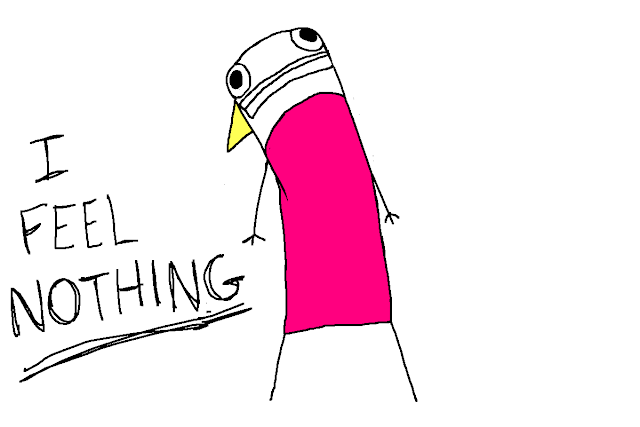
Anxiety is a different monster. While depression is a complete lack of motivation to do anything, anxiety is that constant churning of worst case scenarios in your head. What if you die? What if you lose all your money? What if your loved ones die? What if the plane crashes? And so on.

Note: before I dive into the rest of the post, let me mention that I’m not a practitioner. A lot of what I write in the post is my personal experience, and may or may not be corroborated by scientific research. If you’re going through a depressive or anxiety episode, please consult a medical professional now, or at least read this article. At the lowest points of life, when motivation is low and reasoning is clouded, you just have to rely on faith and trust. So, trust me, go see a psychiatrist or a psychologist. You will get better, as almost everyone going through this does. The only decision you have to make is to see a doctor.
Brain as a prediction machine and depression is when it predicts that actions don’t matter
The decrease of neurotransmitter dopamine is linked to depression and dopamine is associated with brain’s prediction of a reward in the environment, which motivates the individual to take an action to get the reward. This suggests that our mood is really our assessment of how much influence we have over our environment (or, in other words, how much of what we do matters).
The recent breakthrough in psychology is an idea called predictive processing where our brains are constantly predicting what we’ll see in the environment. Only by predicting we can take advantage of the environment around us. When we see a fruit, our brain generates dopamine that literally makes us salivates. That’s the brain’s way of saying to us: go, have that fruit. That’s why feel better in anticipation than the actual event.
Theoretical models suggest that depression could be a strong belief that the external world is uncontrollable, so it’s better not to try. If the brain convinces itself that no action can influence the world, it gets into the mode of taking less risk and conserves body energy. The same model suggests that mania could be a strong belief that the external world is extremely controllable, so it’s better to keep taking actions. Anxiety could be a vague belief that the external world is uncontrollable, so brain keeps on churning questions role-playing situations trying to convince itself one way or another.
Think of depression this way: if I’m confident that my understanding of the world is correct, that makes me more prone to act to get (social) rewards through interaction with the external world. If I doubt my understanding of the world, it makes me retreat from the social interactions to avoid risk that comes with action. Quoting from the paper The Depressed Brain: An Evolutionary Systems Theory:
This depressive response instantiates a ‘better safe than sorry’ strategy that minimises the likelihood of unpredictable social interactions by causing adaptive changes in cognition (e.g., hypersensitivity to aversive social stimuli, a negative thinking bias, deficits in responses to reward) and action (e.g., risk-averse behaviours such as social
withdrawal)
This figure summarizes what happens in a depressed brain.
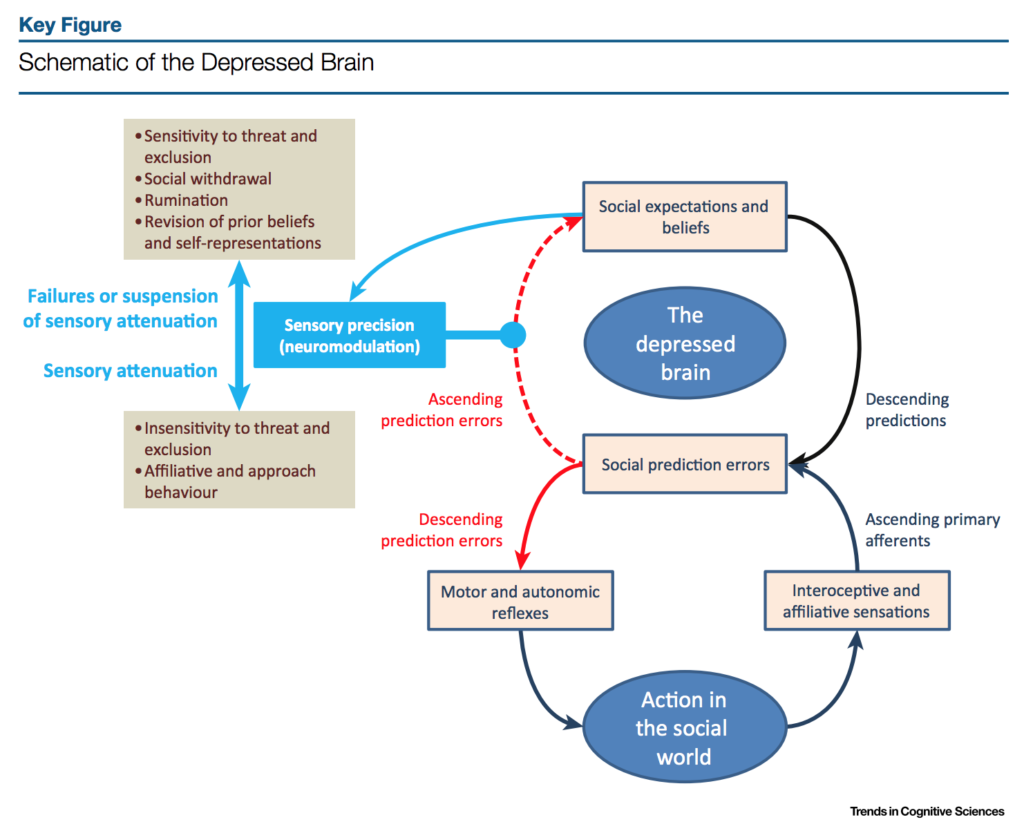
Why depression is on the rise, or why are we losing control over the world?
The depression-as-loss-of-control view suggests that depression triggers when certain environments signal to an individual that s/he no longer can predictably get rewards from it. This is why getting bullied in childhood is a predictor of depression in the later life, and why people in totalitarian states have a higher depression rate.
Depression is on the rise, especially among teens in developed nations. As compared to 1950s, today’s high school and college students are five to eight times more likely to be depressed or have an anxiety disorder.
The theoretical view of depression we discussed above is corroborated by actual studies where US teens are reporting less control over their lives. Over last several decades, the locus of control has shifted from internal (“I control what happens to me”) to external (“The world controls what happens to me”). Along with this, primary goals for young people have shifted from internal (“I want to do what I love“) to external (“I want to be rich, successful and famous“). This loss of control is what’s cited as the primary reason for the rise of depression in recent decades.
While there are many hypotheses to explain the rise of depression, my personal hypothesis is that it’s to do with increased media consumption.
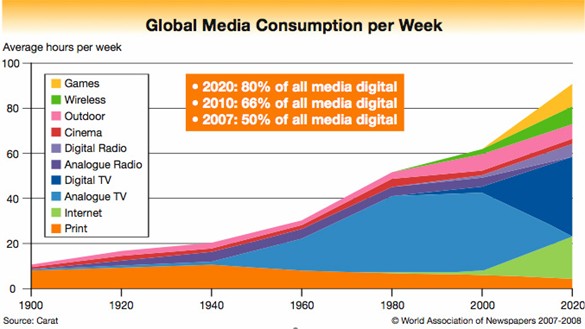
Our model of the world is generated through our interactions with the external world, and with the rise of media, the world has expanded to include extremes. When our brain evolved in ancestral environments, its view of reality came from only the locally proximate individuals. The fastest runner in your hunter-gatherer band was probably 10% faster than you. The wealthy tribe head had probably an extra piece of jewelry. But now the comparison set is the entire world.
With so much media coming our way, we always know of people who are an order of magnitude better than us in all aspects that we care about. We consume info about the richest, sexiest, most famous, and most athletic on a daily basis and that inevitably forms the model of our world. Moreover, in our ancestral environments, since we observed people upfront, we knew their flaws. Today, in the Instagram world, all we know is how perfect our friends are while we intimately know and ruminate over our own flaws.
It also doesn’t help that negative news travels much faster. The news of school shootings, scandals, and potential nuclear wars shape up a picture of the world where we feel that nothing we could do matters. It is worse for competitive people because their desire to bend the world never gets satiated.
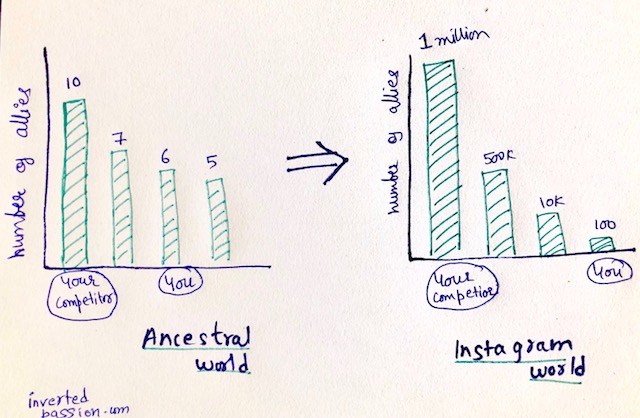
So my guess is that the rise of mental disorders is a result of our conclusion that we won’t be as adventurous as Elon Musk, or won’t be able to do anything to prevent the next war or shootings at schools, or won’t achieve social status as all your friends are cooler than you. In this seemingly hopeless view of the world, why try to do anything?
Except, of course, it’s erroneous. The world was always like this, it’s just that increase in media consumption has exposed us to a view that mostly contains extremes. If something is good, it’s so good that we can’t hope to achieve it ourselves. If something is bad, it’s so bad that we can’t hope to influence it.
Methods to build mental immunity
I asked this question on Twitter and received fantastic responses from people on how they prevent themselves from getting depressed. Go through this twitter thread.
Hello,
I’m writing a blog post on building mental immunity against depression and anxiety. Will post tomrorow.
Let me know if there’s something in your routine that you do which you think helps you being less prone to depression. Thx.
— Paras Chopra (@paraschopra) June 10, 2018
Now, for my personal suggestions:
Excercise, even if you don’t feel like it. Excercise is proven to almost always improve the mood. Starting an exercise regimen when you’re depressed is usually difficult because, at that point of time, you’re not motivated to do anything. So if you’re feeling fine and dandy now, start exercising. Make it into a habit, so that you won’t have to force yourself to exercise when you need it most. I’ve written about how to start new habits in The long (psychological) guide to achieving your new year resolutions.
Throw yourself into action. Depression and anxiety is a prediction problem where we predict things won’t turn out to be good so we avoid acting. An antidote to this is to force yourself to do things that other people enjoy. Usually, it’s your theories of the world that prevent you from going to parties, watching movies, having sumptuous meals or playing games. So if you adopt a habit of treating yourself every time you feel low, you’ll discover that your predictions were wrong. It’s very much like the fact that if you force your facial muscles to seem like you’re smiling, after a while you’ll actually start smiling and hence start feeling better.
Limit your social media and news consumption, seriously. If your Instagram feed is full of people like you who have a million followers, no wonder you’ll feel like shit. Success usually comes via situational factors (aka luck) that you cannot control. You probably know that but your emotional brain doesn’t. That’s why it retreats into a hopeless mode when it sees people doing more amazing things than yourself all the time.
Try cognitive behavior therapy (CBT) even when you’re not depressed. CBT’s main premise is that depression is a cognitive bias and it urges you to reason negative emotions through intellect. I’ve written earlier on how to avoid cognitive biases.
When you’re depressed, because brain predicts that nothing matters, it starts to filter out positive information and becomes attuned to negative information. Confirmation bias towards negativity is very strong during the depression. CBT provides you with tools and techniques to reason out that bias. For example, in the triple column technique, you write your emotional feelings in the first column (“I’m a loser“), then you identify the cognitive error (“Thinking in extremes, confirmation bias“) and finally you write the counter-argument in the third column to it (“You have a job, when there are many without one. You are successful“).
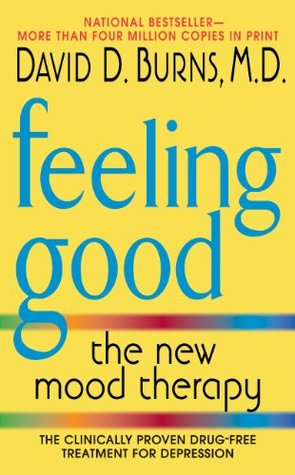
If you want a book recommendation, I highly recommend Feeling Good by David Burns. People read it when they’re feeling low, but you’ll do yourself a favour if you read it when you’re feeling just fine. It’ll help you develop a habit of catching yourself getting caught in a negative mood spiral.
Meditate every day. Meditation is known to give calm and peace, and if you exercise your physical body regularly, there’s no reason why you shouldn’t do a favor to your mind and start meditating every day. A couple of weeks back, I had tweeted about how to go about meditation and the benefits I’ve felt so far. Here is the thread:
1/ A short thread on meditation.
This doodle summarises my experience of a 20-30 minute meditation session. pic.twitter.com/UUEcvJ3RsJ
— Paras Chopra (@paraschopra) May 22, 2018
Summing it up
That’s it. Mental health deserves as much attention as physical health. To be in a good shape, we do many preventive interventions: take vitamins, change our diet, go to gym, and start running/walking. Consider doing the same for your mental health.
Join 200k followers
Follow @paraschopra